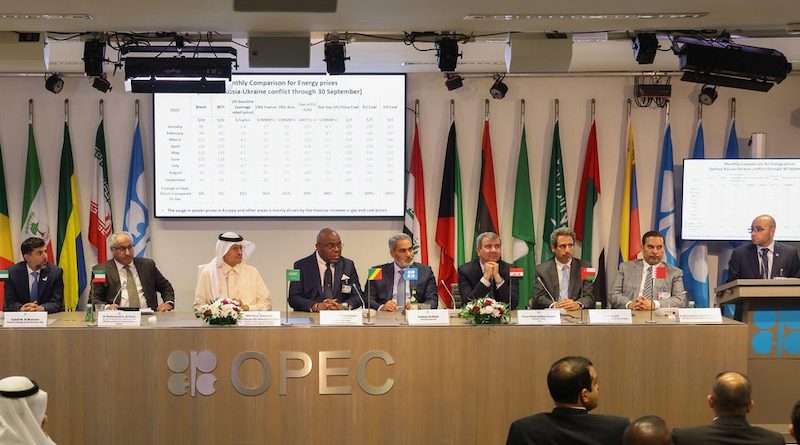The Greed And Geopolitics Of The OPEC+ Oil Production Cut
By Ariel Cohen, Alum of The Fletcher School of Law and Diplomacy at Tufts University
OPEC+’s announcement that they have agreed to cut oil production by 2 million barrels per day sent shockwaves throughout global markets. This cut, equaling approximately 2% of the global supply, will push up oil prices and worsen inflation. In reality, the cut may be about 1 mbd as OPEC failed to meet previous its targets due to sanctions against Russia and other suppliers underperforming. Still, the cut failed to push the oil futures above $100 as of publication.
OPEC+ claimed the step was “…necessary to respond to rising interest rates in the West and a weaker global economy.” While inflation is still high and recession is staring everyone in the face, this move would exacerbate the economic downturn, as high oil prices serve as a de-facto tax on the economy. In fact, the majority of global recessions were preceded by high oil prices.
The move does not make sense even from a purely financial perspective to maximize profit. Increasing oil prices so drastically is liable to further push the world into recession and ultimately undermine Saudi and other exporters by driving down demand while incentivizing energy investments, including US shale, that will compete with Saudi Arabia. Saudi inflation and import woes will also only be worsened by this move. OPEC+’s move only makes sense as a hostile signal to the US.
This move is not unexpected. As I wrote here, President Joe Biden’s failure in Saudi Arabia in July to secure more oil production shook Saudi Arabia’s transactional relationship (security for oil) with the USA to its foundations. Saudi Arabia began importing Russian fuel oils for domestic use to free up more crude oil for export months ago, with the Biden Administration impotent to stop it. Meanwhile, Saudi Crown Prince Mohammed bin Salman (MBS) and Russian President Vladimir Putin have enjoyed close personal relations for years. These events had already helped push oil to above $90 per barrel. However, the oil futures on October 7 remained below $90 due to recession fears.
This production cut is a strategic move by the Saudis, whose share of the oil market is simply too big for the rest of OPEC+ to resist. While the move is a friendly gesture to Russia and a great boost to their revenue streams, it is also a broadside against the Biden administration preceding the midterm elections.
The backslide of dialogue between the US and Saudi Arabia has revealed a tangible disdain for Biden and the Democrats from the Kingdom’s perspective as Biden desperately tried to salvage the Obama-era JCPOA nuclear deal with the mullahs’ expansionist theocratic dictatorship. US Criticism for the grisly assassination of the Saudi citizen and US media commentator and regime opponent Jamal Khashoggi in Istanbul, and the USA’s bungling of regional security issues important to the Saudis such as Iran and Iraq, and the Yemeni Houthis, a Teheran-supported insurgency which temporarily disabled 50% of Saudi oil production didn’t help either.
Biden’s administration greeted these developments with disappointment. “The President is disappointed by the short-sighted decision by OPEC+ to cut production quotas while the global economy is dealing with the continued negative impact of Putin’s invasion of Ukraine”. While Biden should be given due credit for opposing Russia and helping Ukraine, it must be recognized that a more robust energy policy would have avoided many of these woes. The Biden administration’s early attempts to shift oil production out of the USA while alternative energy sources were yet to come online has created a national security vulnerability now being exploited by Saudi Arabia and Russia.
The Democratic Party’s Energy Doctrine, released early in the administration’s term, signaled opposition to hydrocarbons being produced in the US and disinterest in energy security. Similarly, a moratorium on oil and gas drilling permits was issued early in 2021, one of the main contributors to the administration’s difficult situation.
While Biden made missteps in the past, this situation is not unsalvageable and presents the USA with an opportunity. This move must be recognized as an unfriendly energy and economic policy step, and every diplomatic and political tool should be on the table to signal US displeasure toward Saudi Arabia for its partnership with Russia. Domestically, this energy crunch could give Biden the political capital necessary to oppose those within his party who are willing to sacrifice American voters’ well-being to their super-green ideological proclivities when the US per capita emissions are dropping to the level of 1913 with total emissions by volume also in decline.
The Biden administration should loosen the Department of the Interior’s restrictions on oil and natural gas drilling and production and make the long-term investments necessary to increase US production of oil and gas. These investments could be paired with cleaner energy sources (especially nuclear) to sustain the USA’s long-needed energy transition.
The administration has stumbled into a situation where the possibilities for comprehensive energy security reform are closer than ever before, while also giving Biden the opportunity to rebalance its Middle East policy, further isolate the teetering Iranian regime, and rebuild its strategic relationship with Riyadh. It remains to be seen if he will summon the political courage to seize it.
This piece is republished from Forbes.

